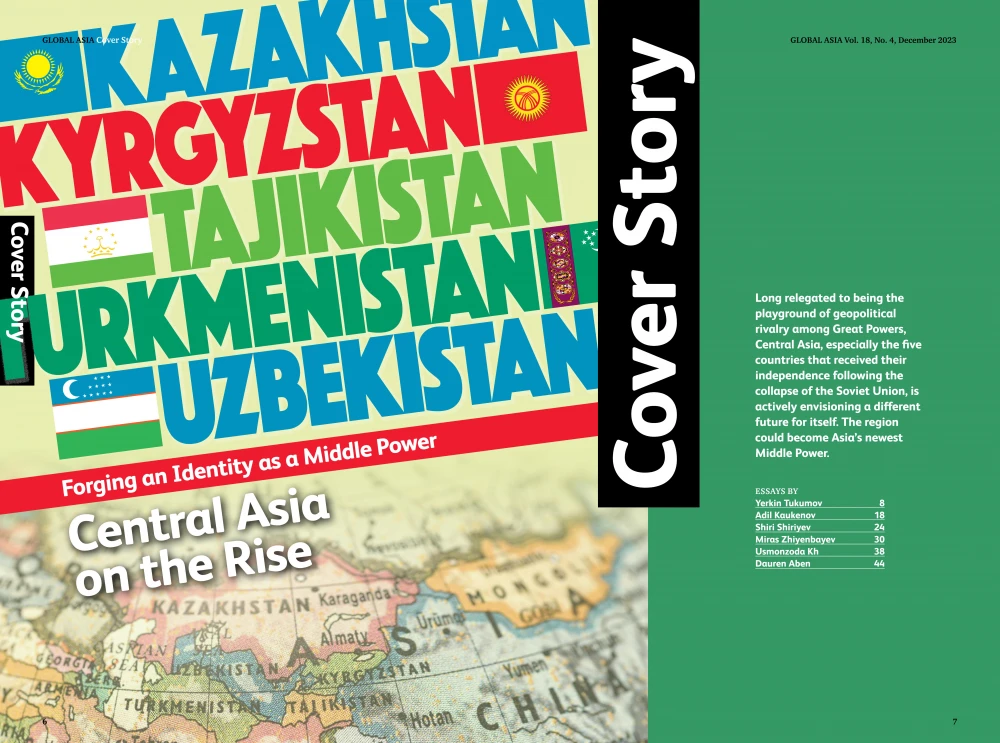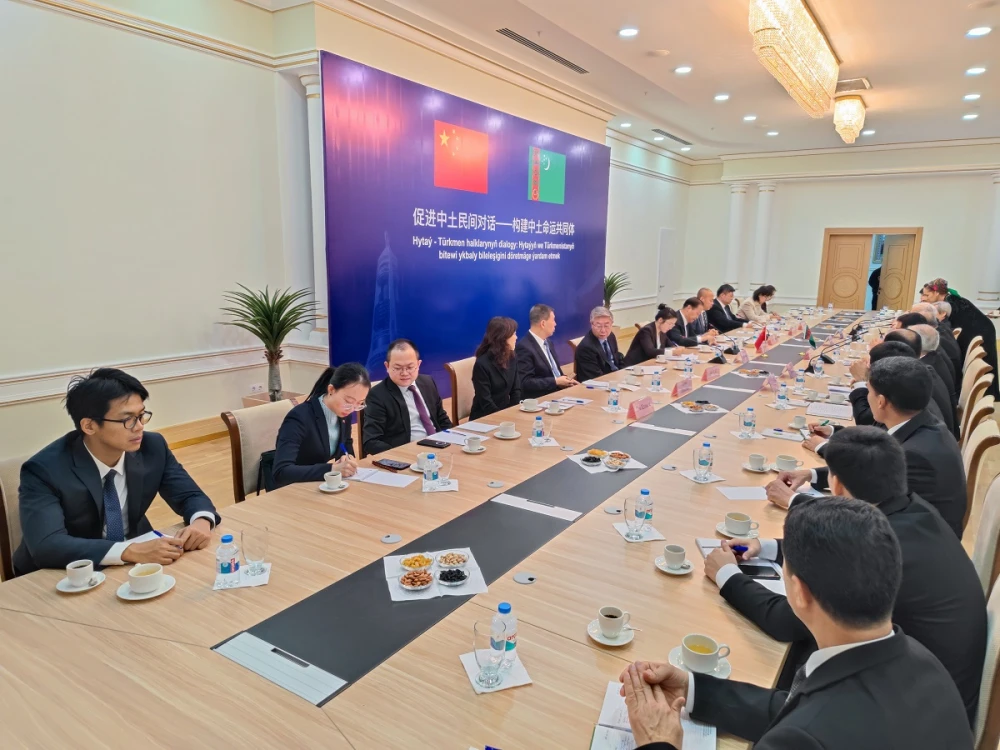
29/12/2023
2192
The Vital Role of the Caspian Sea
Perhaps no geographical feature is more important to the future of Central Asia than the Caspian Sea, rich as it is in natural resources and central to transport routes that link littoral states to each other and to regions beyond. It is also crucial as a focal point to bring together the states of Central Asia. Turkmenistan has played a key role in fostering that co-operation, writes Shiri Shiriyev. Published: December 2023 (Vol.18 No.4)
About the author
Shiri Shiriyev is director of the Scientific Centre for Strategic Studies at the Institute of International Relations of the Ministry of Foreign Affairs of Turkmenistan.
TURKMENISTAN devotes a lot of attention to issues involving the Caspian Sea. It is one of the priorities of its foreign and domestic policies and a deliberate focus of the country’s leadership. The Caspian region is the most important geopolitical and geo-economic space on the Eurasian continent. The objective interests of coastal states as well as neighboring countries are concentrated here because the region is a major source of hydrocarbon resources, a transport and transit hub on a continental scale and a favorable location for expanding international trade. Along with this, the Caspian Sea is a unique natural complex with its own ecosystem, which requires an expansion of international scientific research.
Peace, security, friendship and mutually beneficial co-operation between littoral countries are the key elements for the stable development of the region, and the creation of new political and legal foundations of multilateral interactions in the Caspian region. Turkmenistan supports a comprehensive approach to a Caspian agenda that includes issues such as security, economic development, ecology, navigation, rational use of biological resources and emergency prevention.
In this regard, the first Summit of the Heads of the Caspian Littoral Countries, held at the initiative of Turkmenistan in April 2002 in Ashgabat, played a very important role. It laid a solid foundation for a systemic, multi-level and regular negotiation process in the Caspian region.
Moving Forward on Co-operation
In recent years, the leaders of the Caspian states have achieved notable results through far-sightedness, political will, mutual understanding and consideration of each country’s interests. The most important agreements in the political and diplomatic spheres involve a broad and meaningful legal basis for dialogue and sustainable co-operation. As a result, the Convention on the Legal Status of the Caspian Sea was signed by the presidents of the five Caspian states in 2018. This important document opened up major prospects for partnership between Turkmenistan, Russia, Iran, Kazakhstan and Azerbaijan.
A lot of work has been done and a lot of ground covered over the past 22 years in order to create the convention, not only for the Caspian states, but also for the entire Eurasian continent. The first meeting of the foreign ministers of Azerbaijan, Iran, Kazakhstan, Russia and Turkmenistan took place in 1996 to discuss Caspian issues and to co-ordinate approaches to develop the convention. During the negotiations, which had actually been going on for almost a quarter of a century, eight meetings of the heads of foreign affairs departments of the Caspian states were held, the last of which took place in Aktau on the eve of the fifth Caspian Summit on Aug. 11, 2018.
The Convention on the Legal Status of the Caspian Sea is designed to regulate the relations of all five Caspian states. It stipulates that the bottom and bowels of the mineral-rich Caspian will be delimited according to the sectorial principle, while the water area itself will be divided into internal and territorial waters, fishing zones and common water space. By that time, the Agreements on the Conservation and Rational Use of Aquatic Biological Resources had been signed at the Astrakhan summit on Sept. 29, 2014, and were already in force.
At the fifth summit of the heads of the Caspian states, issues of strengthening co-operation in the humanitarian sphere were raised. The parties agreed to hold consultations on the development of tourism in the Caspian Sea region, the organization of cultural exchanges, media forums, youth gatherings and sports competitions. At the same time, Turkmenistan announced another important initiative — the creation of a regional transport/logistics center to improve partnerships in the field of transport.
An important clarification in the convention is that the laying of pipelines on the seabed of the Caspian Sea is the prerogative of the parties through whose territory they pass. In addition, the parallel environmental pact implies that other littoral states can influence infrastructure projects in the context of environmental protection.
Over the years, a solid package of five-sided agreements on specific areas of activity in the Caspian Sea region have been signed. Nevertheless, it is necessary to focus on solving the practical problems of pan-Caspian development in order to make further advances.
Among them, the most important is providing a powerful push toward interaction in the energy sector. According to the data of geologists on the proven reserves of the Caspian littoral countries, the subsoil of the Caspian and adjacent territories hold large reserves of hydrocarbons. In addition, the US Geological Survey (USGS) has calculated that the Caspian contains 20 billion barrels of oil and 243 trillion cubic feet of natural gas to be explored.
The efficient use of these natural resources will provide a strong impetus for the dynamic growth of national economies, not only of the coastal states, but also of neighboring countries, providing conditions for the creation of new infrastructure, the construction of industrial facilities and the further prosperity of the peoples of the coastal countries.
Returning to the convention, it is necessary to note its importance in preventing the presence of armed forces of extra-regional powers in the Caspian Sea region. The key principles of this decision are to ease tensions in the region and intensify intra- and inter-regional economic co-operation.
Defense and Energy Security
Thanks to this favorable environment, Caspian Sea ports are being upgraded, including the Turkmenbashi International Sea Port, the largest and most modern in the Caspian, which is an important transport and logistics hub for the Black Sea basin, the South Caucasus and Central Asia. Even warships, submarines and other military vessels of Caspian states that pass through the territorial waters do not have the right to enter ports and anchor within the territorial waters of another state. The exception is cases where “there is appropriate permission for this or it is necessary due to force majeure or distress, or to provide assistance to people, ships and aircraft in emergencies.”
The signing of the Convention on the Legal Status of the Caspian Sea also was an important step toward global energy security. All further issues in the region will be resolved based on this document and the agreements concluded at the Caspian summits.
The Caspian is located at a crossroads. The territories of the Caspian states have direct access in the east to the Asia-Pacific region; in the west to the Black Sea and the Mediterranean; in the south to the Near and Middle East; and in the north to the coast of the Baltic Sea. In short, the Caspian countries occupy a key geographical space. This configuration offers prospects for creating sustainable routes along all major geographic azimuths. However, in order to function effectively, the Caspian states have to establish a well-functioning transport-communication system with each other, to define clearly algorithms of actions and to work more actively on plans for interaction in this area.
All this would be aided if a Caspian regional logistics center co-ordinated the joint activities of the Caspian states in the effective use of transit and transport corridors connecting the Eurasian continent.
Diversifying Resource Development
The Caspian economic strategy of Turkmenistan is based on the implementation of large-scale and long-term projects in such areas as energy, industry, transport and trade. Thus, Turkmenistan is actively developing deposits of hydrocarbon resources not only on the shelf of the Caspian Sea, but also in that part of the Caspian zone that is under its jurisdiction. In close co-operation with foreign companies, factories are being built on the Turkmen coast of the Caspian Sea to process hydrocarbon raw materials and produce products such as mineral fertilizers, polymers, liquefied gas and various types of oil products.
Turkmenistan, which is committed to diversifying energy flows, has expressed its readiness to continue co-operation with European partners on the implementation of the Trans-Caspian pipeline project. The idea for its construction, initiated by Turkmenistan, was initially considered not just as an economically and commercially viable project, but also as a key condition for ensuring global energy security and sustainability on the basis of equal consideration of the interests and benefits of producers, consumers and energy transit countries.


